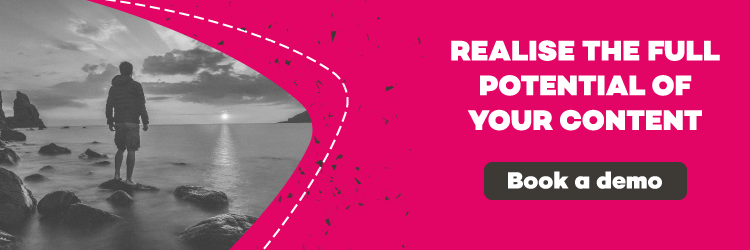Video transcript below:
Hi, I'm Nick Ashwin, V.P. of Sales, at Imagen. I'm responsible for the commercial growth of the business in the U.S. market and it's particularly a great job to have because we have a product and tool suite that is really well aligned to the sports media markets in particular. And that's something that I've been working on for the last several years.
What emerging trends in sports content consumption are you seeing?
There's two main things here from the emerging trend standpoint, the first one is probably less emerging. It's here, which is obviously the social media side of stuff.
So, your TikTok's, your Instagram's, Facebook's, content that's really, really short form and going to be used across those platforms. But then I think that the kind of in-between step between linear stuff and that social ready stuff is kind of the mini-series type content. The 10-15 minute episodes that people can just digest really quickly and easily. And that is offering such a new way of leveraging existing assets that you may have in your archive and combining them up, obviously, with new content as well. And if you look at, why are people doing that? Well, I mean, the first one is obvious. And I think that that speaks more to the social media content, which is it enables the content creators on behalf of their teams and organisations to create deeper bonds between the fan, the watcher, the consumer and the player, the competitor and the team. You show them a behind the scenes, you show them that kind of stuff that immediately creates a much deeper bond.
But then the second one is much more economic, above and beyond the social content, those mini-series, those types of things, they offer different levers. They offer different sponsorship lever, that it's just a bigger menu to choose from an economic standpoint, when you’re going out there and selling partnerships, sponsorships and rights and that kind of stuff. So, it just offers so many more opportunities. And I think that is a really interesting trend right now.
Who do you think are doing these activities well?
Well, lots of lots of sports organizations, and we're fortunate to count many of them as customers of Imagen, but something is near and dear to my heart is rugby.
The Lions tour is going on right now in South Africa, and I have to say that I've been watching an awful lot of a different little mini-series being based around predominantly archive content, on YouTube. So, I was watching one just recently where they had an ex-Lions player paired up with Famous Grouse whisky on behalf of RugbyPast.com, which is a big sports content aggregator for rugby. And it was a wonderful miniseries, it's memories past, interviews from previous Lions players and then discussion about the upcoming tour, 10 to 15 minutes per episode, really digestible, something you can watch anywhere. And I just thought, what a wonderful opportunity to get Rugby Past out there to and get the Famous Grouse sponsorship out there and to reuse some assets from the archive to get the Lions logo out there as well. And all delivered over something like YouTube, which is obviously accessible. I just really enjoyed that.
How does Imagen help with these content activities?
I look at it from two perspectives, the first one is, is around sort of general visibility in which Imagen and obviously helps tremendously because it brings archives out to the forefront, that shop window, if you will. The reason that's so important is because if you allow both commercial minds and creative minds to see content, they can start to think about ways to use it. If they don't know it's there, if they can't see, it's very hard for them to really think about how to leverage those assets in either a storytelling fashion or in an economic fashion.
So, let's just take for example, you've got an entire year of a Super Bowl or a championship winning year, you've got all this great content. If you can put that in front of the right person, they can figure out how to pack it up from a storytelling perspective and package it up from an economic perspective and then actually leverage it properly. If they can't see it, if they don't even have access to review that stuff, then it makes the content so much less valuable. You just you're far less likely to leverage that content.
The second one really comes down to the distribution side of things. So, Imagen brings that archive to the forefront in its standard offering. But what it also does really neatly is it helps people get that content out once they've actually arrived at some economic relationships with people. It automates a huge amount of the delivery up to the various partners that need access to stuff based on certain rights agreements as well. It's a technology that can really underpin a much broader content strategy to make sure that there's far less humans involved in actually delivering content to those partners and people paid for the rights through to reuse that content.
What do you think is next?
Well, I think certainly what we see and understand of the market is just how much are really everything is rooted from an economics perspective and understanding the rights agreements that are combined with any given asset. In its current form, I think it's fair to say that it's pretty manual process aligning all of that paperwork and those rights with the assets themselves.
There are some systems that are out that are kind of been hacked together that are doing it in a slightly more joined up way. But I can fast see approaching a time where there is one system that that does it all. It's the use of the asset management system, where all your video, images and all of those things are hosted and available and really easy to see, what Imagen does today. But then alongside that, you've got in a very readable, usable way, in a very data driven way, all of the information around who's allowed to use what, when and where. And you combine those two things up and you can start to really look at those packages and maybe even think about new ways you can leverage those packages and just find new economic outlets for that content, whether it be archive material or your new content as well.
So, I think bringing those two pieces together would benefit a lot of people, I really do. I think it would save a bunch of time and money and really open up some more economic opportunities as well.





